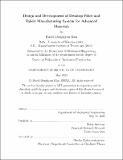Design and development of desktop fiber and fabric manufacturing system for advanced materials
Author(s)
Kim, David Donghyun.
Download1191716321-MIT.pdf (125.3Mb)
Other Contributors
Massachusetts Institute of Technology. Department of Mechanical Engineering.
Advisor
Brian Anthony.
Terms of use
Metadata
Show full item recordAbstract
This thesis presents two novel desktop fiber manufacturing systems and a desktop fabric manufacturing system. The desktop fiber manufacturing system achieved two goals. The first goal was the use of the system to teach smart manufacturing fundamentals. The second goal was to develop a low-cost platform for prototyping the fiber for biological and neurological research applications. The educational system was deployed in multiple classes, which proved to be a useful tool for teaching smart manufacturing. The advanced fiber manufacturing system was able to produce a variety of fibers using different preform materials. The preform materials included fibers with Polycarbonate(PC) core and Polymethyl Methacrylate (PMMA), hollow fibers with PC and PMMA, and 3 layer fiber with Polystyrene (PS) cladding, Polycaprolactone (PCL) layer, and PS core. These fibers were used for neural probing and cell scaffold. Finally, a generalized approach to designing a desktop fiber prototyping system is introduced. For the fabric manufacturing system, a novel knitting process was invented. Nitinol (NiTi) wires exhibit either shape memory properties or super-elastic properties. There has been extensive research progress on using conventional knitting machines to produced knitted fabric with shape memory Nitinol wires. However, there has not been any development with knitting the fabric using super-elastic Nitinol wires without preprocessing. With the new system, the super-elastic Nitinol wires can be directly knitted without preprocessing the wire to loop shapes. The new system significantly reduces the processing steps to make knitted super-elastic fabric. The resulting fabric showed large strain capabilities at low stress. This thesis will describe in detail the design and fabrication of the fabric knitting system. It will also discuss the property of the knitted fabric produced from the system. The model was introduced to characterize the stress and strain relationship of the fabric. The model was also validated with the experimental data. The generalized approach in designing the super-elastic fabric system is also introduced. The relationship between the resulting fabric properties and the design parameters are discussed.
Description
Thesis: Ph. D., Massachusetts Institute of Technology, Department of Mechanical Engineering, May, 2020 Cataloged from the official PDF of thesis. Includes bibliographical references (pages 107-113).
Date issued
2020Department
Massachusetts Institute of Technology. Department of Mechanical EngineeringPublisher
Massachusetts Institute of Technology
Keywords
Mechanical Engineering.